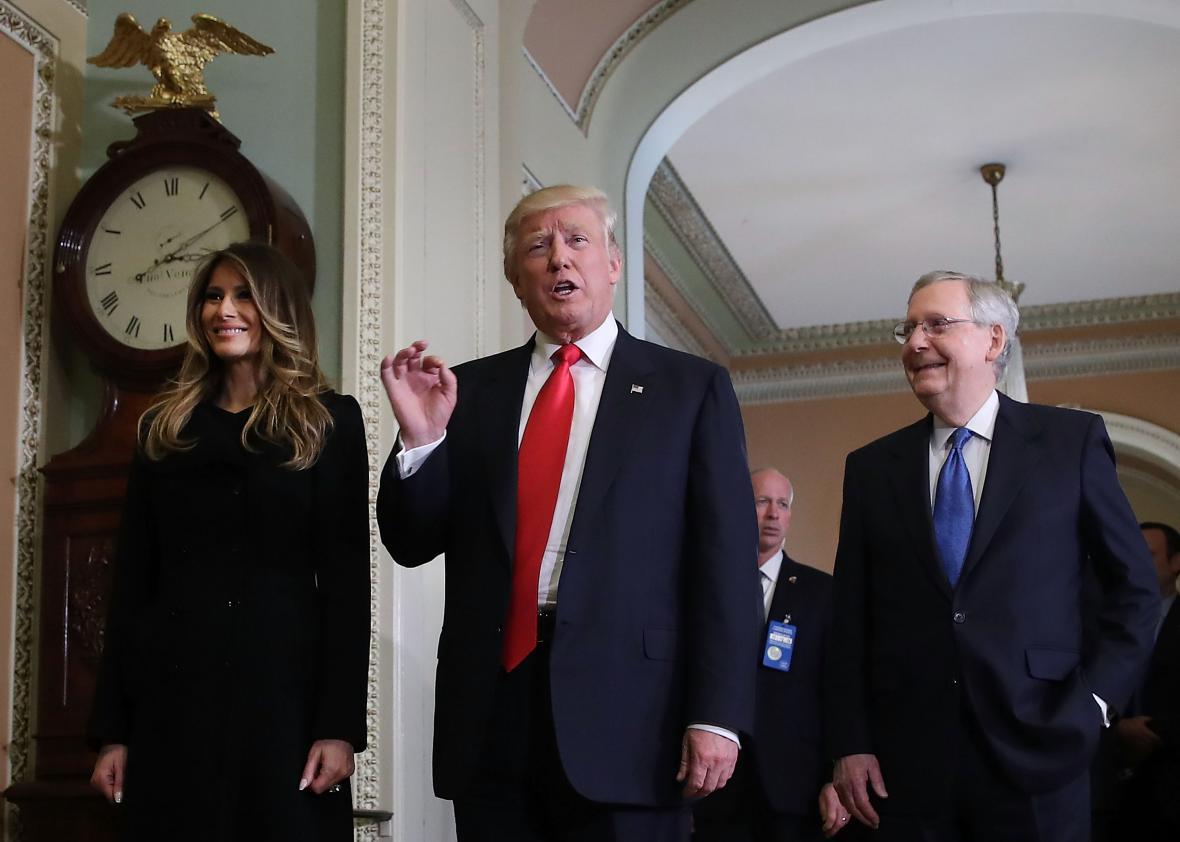Donald Trump, as you may recall, is mulling over a policy that would ban Muslims from entering the United States and is considering tracking ones already here in a database. He has endorsed shutting down mosques and defamed thousands of Muslims in New Jersey—”Arabs,” he said—by claiming, repeatedly, that they had celebrated the deaths of 3,000 Americans on 9/11. He said that the Mexican undocumented population in the United States—11 million or so people in total, all of whom he has pledged to deport—is comprised of rapists, murderers, and “some” morally upstanding people of indeterminate number. He said this past March that as president, he would be able to force the United States military to torture prisoners and commit any war crimes he deemed justifiable and necessary. He is nuclear massacre-curious. He responded to reports that overzealous supporters of his had beaten and urinated on a homeless Hispanic man by saying that they had simply “loved their country.” He called for the execution of five black and Hispanic men found to be innocent of the crime for which they had been convicted. He is being sued for fraud. He has done business with the Mafia. He has been accused of sexual assault by around a dozen women.
For over a year, Democratic Party politicians and leaders have told the American people that for these and endless other reasons, Donald Trump could never be countenanced as the president of the United States. Now that he’s won, it seems that many have changed their minds. Donald Trump, the New York Times reported last night, is someone Senate Democrats think they can work with:
On infrastructure spending, child tax credits, paid maternity leave and dismantling trade agreements, Democrats are looking for ways they can work with Mr. Trump and force Republican leaders to choose between their new president and their small-government, free-market principles. Senator Chuck Schumer of New York, elected Wednesday as the new Democratic minority leader, has spoken with Mr. Trump several times, and Democrats, in coming weeks plan to announce populist economics and ethics initiatives they think Mr. Trump might like.
A hundred years from now, some young soul wondering what became of the world is going to wade through some flooded coastal library, blow the dust off a decrepit computer terminal, and read, in wonder and amazement, about this thing, this creature of infinite stupidity—the “Democrat”—that thought it could outsmart a man who used so-called charity money to buy a 6-foot-tall painting of himself by getting him to commit to “ethics initiatives.”
Infrastructure spending, child tax credits, and paid maternity leave—these are all good things. But their goodness isn’t the point. The point is that Donald Trump has shown no signs whatsoever that we should anticipate a major break from Republican Party orthodoxy. His rumored Cabinet and transition team have been populated by a who’s who of GOP stalwarts and “fringe” figures whose ideas the GOP has merrily spread to its voters. The man who said he could shoot a random passerby on Fifth Avenue without losing support is not, on the vast majority of issues save perhaps immigration and trade, going to feel an obligation to maintain the heterodox counter-GOP stances he took during the campaign in order to keep his voters. Donald Trump, who must know, at this point, just how in over his head he really is, is simply going to follow the path of ease and least resistance. On the majority of issues, he’s going to do what the Republican Party tells him to do and perhaps the worst of what he promised voters he would do. And, as Jamelle Bouie wrote yesterday, the Democratic response, at every turn, should be resistance, not normalization:
Supporting a Trump-branded infrastructure initiative as a discrete piece of policy where two sides can find common ground only bolsters a white-nationalist politics, even if you oppose the rest of Trump’s agenda. It legitimizes and gives fuel to white tribalism as a political strategy. It shows that there are tangible gains for embracing Trump-style demagoguery. Likewise, it seems reasonable to want to recast support for Trump as an expression of populism. But Trump’s is a racial populism—backed almost entirely by white Americans, across class lines—that revolves around demands to reinforce existing racial and status hierarchies. That’s what it means to “make America great again.”
“Ethics initiatives.” God help us.
